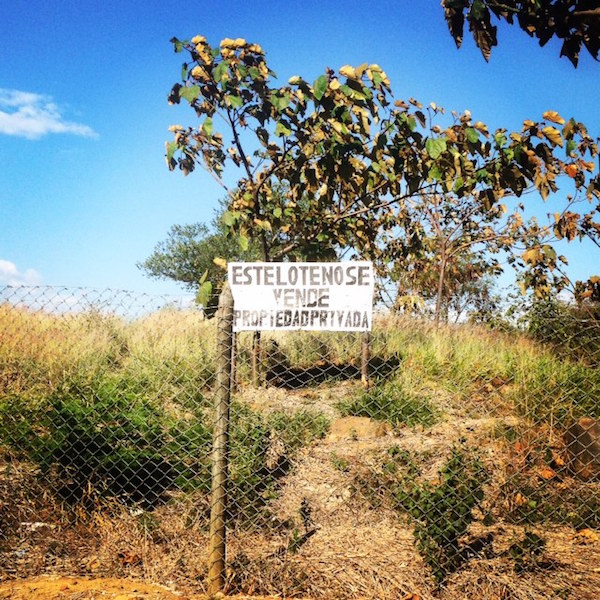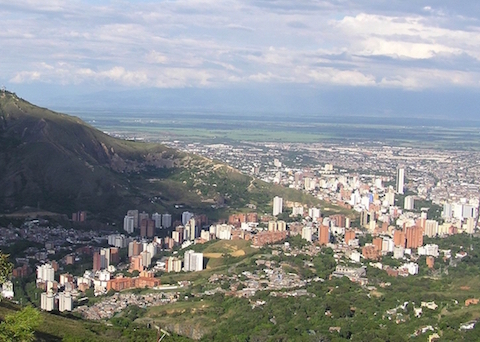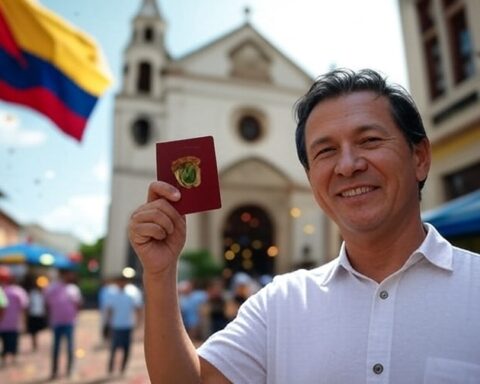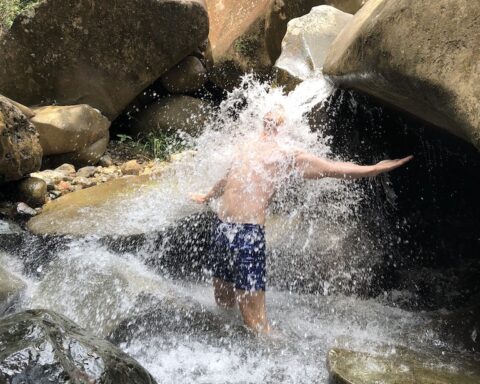It was the perfect piece of land for an apartment complex. Located in the upscale neighbourhood of Cristales in Cali, slightly elevated and with an amazing view of the city. The lot was begging to be developed.
A long story made very short, we bought the lot mentioned above only to find out that we had been the victims of a scam. The day we started drilling for soil samples, 1 month after paying and completing the legal paperwork, a guy appears at the lot asking what we were doing. We told him that we were preparing to build a six story apartment complex. His first comment was that it would be impossible – the land belonged to his family and they had just had their building permit approved just a few months earlier. Because of financial issues they had been unable to start construction. This naturally started a massive investigation, involving lawyers, our builder and the public authorities.
After 2 days of no sleep and excessive due diligence we realised that we had not bought the lot – but the building next to the lot. On the papers the property still appeared as a lot, because the owner never applied for the permit to build and never nor did he upon completion register his apartment complex. Those applications are expensive and so are the upcoming fine that he is now facing.
The entire block (called a Manzana) only had one empty lot, which was why we did not bother to study the city maps in detail during our research.
On paper, we are (still) the legal owners of next-door building. The owner has now discovered that we have taken possession of his property and is suing us and demanding a cancellation of the transaction, which I’m sure he will get. By studying the signatures and fingerprints of our fake seller it is visible that they do not match those of the real owner on the title.
We have been the victims of a group of scam artists. We bought the land from a person who was not the real owner, but an impersonator with a fake ID and great photoshopping skills. So good that the notary and bank accepted it as valid. The seller insisted (in a very nice way) on using a certain secretary at a certain notary to make the escrituras (explained below). By now we know that the woman who did all the paperwork at the notary has most likely been working with the impersonators. We also figured out later that it (Notaria 5 in Santa Monica, Cali) was one of the only notaries in Cali without a digital fingerprint scanner.
The bank cashier who cashed the check that we issued for the seller could very well be part of this fraud as well. The same goes for the officials at the Oficina de Registro de Instrumentos Publicos who registered the transaction. So could the real owner of the property that we bought. Maybe he was in financial problems and “loaned” his ID and papers to the scam artist to facilitate the transaction. So far we don’t know much. With footage from surveillance cameras and fingerprints we might be able to catch these people. There is a slim chance and we are working hard to resolve the situation and are in the process of suing the notary and people involved if the authorities can track them down.
In effect we have lost over US$100.000 plus time and money spent on lawyers, architects, land studies.. Etc. And not only that – we also have a potential yearlong legal headache in front us trying to correct the situation, finding the people who cheated us and seek compensation… however unlikely that might be. I’ll write another post in the future about how frustrated our dealings with the legal authorities here have been.
I won’t bore you with the details and there are also too many to share them all here. But I think you get the fact: In Colombia or anywhere else in South America you have to be very very careful before paying or signing for land or buildings.
It is easier to be wise in hindsight. To prevent fellow investors and home buyers from ending up in the same situation, I decided to make a step-by-step guide that you can use, to avoid the traps that we fell victims too.
First I want to let you know what documents (in Spanish) you need for your due diligence in Colombia. Second I’ll let you know how to go about the different steps. Please note that I am no lawyer, so please do always consult with a one before signing anything.
Most properties in Colombia are found via for sale “Se vende” signs on that actual property, through classified ads online or in the local newspaper, on fincaraiz.com.co or through local real estate agents. Scams are so common here, that many properties even have signs saying that the property is NOT for sale.
We trusted our seller. He was a sixty-something year old gentlemen who claimed to be dying of diabetes. For that reason he had to sell the property in order to avoid a future legal fight between his wife, ex-wife and kids. He walked with a cane, sweated a lot. Honestly, he looked ill and acted the part. In Colombia don’t trust the seller. Instead, trust your own due diligence.
Documents for due diligence
Certificado de Tradición y Libertad: A “historic” document listing all of previous owners chronically. This is important for various reasons. One is that in Colombia, druglords have previously owned a lot of land and properties as a way to launder money. If you ever buy one of those properties it will be impossible to sell again. It’s like bad karma and people are scared of a druglord one day getting out of jail and claiming his property back. Cali, where I live, is full of abandoned properties in very attractive locations that are unsellable for exactly that reason. The country has more than 50.000 of such properties, many of which have been confiscated by the government. In certain cases the government will create something called “Extinción de Dominio” where they clean the title history and auction off the properties to the public. This is the only exception where it is ok to buy a property with a bad history. We have once bought an apartment through one of these auctions and sold it 4 years later without any problems.
The Certificado de Tradición y Libertad also has a section called “Anotación” which is where any debts against the property will be listed.
A lawyer specialised in real estate should do the study of the previous ownership.
You may ask seller to provide these papers, but if you are serious about buying, the best way to make sure that the certificate is original, is by going to your local Oficina de Registro de Instrumentos Publicos or visit the Superintendencia’s website and get a print of them yourself. The certificate costs $13.500 pesos. If you want to amplify the history of ownership to more than 30 years, the price goes up to $29.400 pesos.
Escrituras: Is the property deed. This is the document that is developed at the notary and signed by the seller and the buyer. It states the address of the property, the area, the matricula (your lot number in public registers) and potential boundaries/limitations, which could include that a sale needs to be approved by all extended family members, which is not uncommon at all. It can be a lot of techical legal Spanish. Your lawyer should also study these papers.
You usually get these papers from the seller, but the notary that originally made them for seller should also be able to provide them.
Impuestos prediales: Are the property tax papers, which includes the public assessment of the property. It will tell you how much annual property taxes are. If someone tries to sell you a property for a lot less than the public assessed value, that should ring an alarm. Also, a property transaction will not go through if the annual taxes has not been paid. At the day of signing/buying at the notary you will need a document from the Mayor’s office, the CAM (Centro Administrativo Municipal), called a Paz y Salvo which certifies that the taxes on the property has been paid. This is the sellers responsibility.
Again, seller should provide these papers, but you can also get them from the CAM.
Paz y Salvo from the administration: This is when buying apartments or houses in gated communities. It is not the most important document for you get in order to begin your due diligence, but in order to close the deal, you will need this document from the administration, stating that the property does not owe any HOA fees. Get it from seller or ask to talk to the administrator directly.
MegaObras (Only for Cali): An extra one-time tax imposed on all properties in Cali to improve the infrastructure of the city. It can be paid in one or several instalments. Verify if your property owes money in MegaObras before signing. If the seller has been paying in instalments then he will have to be up to date with these payments as well before selling is possible. If the MegaObras are not paid entirely before buying, the new owner will be responsible for paying the remaining amount. It is usually part of the negotiation. I prefer to make sure that all taxes are paid completely before signing. In either case, you will need a Paz y Salvo for the MegaObras before any transaction takes place. It also comes from the CAM, but have seller bring it.
Mapa Catastral Urbana: An urban city planning map, printed at the CAM in the Oficina de Catastro. This is mostly relevant if you buy a house or a lot. If buying an apartment the escrituras and certificado de tradición y libertad should be plenty to document the address.
The map costs around $40.000 pesos to print. Ask for one covering the address you are planning to buy. It will show you the exact layout of the entire city block or neighbourhood, but also tells you the area for each lot and give you the matricula to match with each subdivision, so you can verify that property you are looking at is in fact in the location where you think it is. This step alone would have saved me US$100.000.
Procedures for buying land / houses / apartments in Colombia
The bullet-list below is based on my bitter experience. You could skip some of the steps, but I suggest that you don’t. In hindsight it is usually easy to see where you went wrong and in the step-by-step guide below, I have included all the things that I neglected to do. It was my first purchase here. I was naive and confident but unexperienced and trusted the process. Don’t ever trust the process in Colombia! Here we go…
- Ask the seller or real estate agent for escrituras, certificado de tradicción, impuestos prediales, and ‘recibo de MegaObras’ (if buying in Cali) – send it to be studied by your lawyer or even better – ask your banker for the contact information of the lawyer they use for their title studies. The price with our bank (Bancolombia) was 600.000 pesos (US$200) – our regular lawyer charged 2.000.000 pesos (US$700) for the same service. We used our own lawyer. In hindsight, I would go with bank’s lawyer. First of all I did not know that they were that much cheaper. Second, since banks finance a lot of real estate their lawyers have a lot more experience – and as a lending facility they have a natural interest in doing careful due diligence. They often work slower, but it could very well be worth the patience.
- In the dealing stages, beware of the seller or agent calling you from different phone numbers.. if so, they might be carrying a pre-pay phone where you can reach them but use the people selling minutes on the street whenever they want to contact you. This should be a warning lamp as it seems odd for people selling a property and serious real estate agents alike. It is worth paying attention to. This happened in my case – I just did not think about it.
- Make sure to meet the actual owner and don’t be ashamed to ask to see his ID. Make him introduce you to the neighbors of the property to verify his identity. If he does not know the neighbours this should be another warning. You can also go directly to the neighbors and ask them questions about the neighbourhood, security issues, the seller, etc. I wish we had done this in our case. I did not introduce myself to the neighbours until after I had bought the lot.
- Stay away from deals where one or several of the persons on the escrituras have died and the property is undergoing succession. It’s called “herencía” or “sucesión” – it will take forever to finish the deal, 1-2 years is not uncommon and there will be a lot of different (often conflicting) interests at stake. Buy while people are still alive – It’s a lot easier.
- Never take the salesman’s word for how much you can build on the land if buying a lot. Visit the nearest Curaduaría, which is the office where they give the building permits. They have been privatised and in bigger cities there are usually several located around the city. Ask about the POT – Plan Ordenamiento Territorial for your property and what the zoning says regarding maximum number of stories, maximum constructible area, amount of parking lots necessary, residential, commercial or industrial area, etc. Cali also has this information available online, although it is a little tricky to figure it out – http://idesc.cali.gov.co/aplicacion.php#. I highly recommend visiting the office in person.
- If you are buying a property in an apartment complex or a house / lot in a gated community it is worth investigating if there is a lot of debt in the form of non-paid HOA fees – it’s called “Administración” in Spanish. Ask to talk to the administrator of the complex / building. My girlfriend and I have bought our own house in a small 24-house gated community only to find out that there was $300 million pesos in debt to the administration. The result being that there are no money to withstand unforeseen expenses. In our case it means that walls don’t get painted when needed, the soccer and basketball court is a mess, the swimming pool does not get cleaned, dripping gutters don’t get replaced, and some houses have problems with water coming through the roof when raining. Not cool.
- If you decide to make an offer go ahead – nothing is binding at this stage. I always make a low offer 25-50% below the asking price to get a feeling about what position the seller is in: Is he/she desperate, patient, hungry…etc. When you get serious stage and agree to actually buy, as mentioned above, I suggest that you go to the notary that issued the Escrituras and verify that they are in fact the original ones. Also, now is the time to visit the Oficina de Registro de Instrumentos Publicos or their website and print the Certificado de Tradicción y Libertad for yourself. Make sure it says “lote” if you are buying a lot, “casa” for a house… etc.
As mentioned above, if buying a lot or a house, I’d recommend you to swing by the Oficina de Catastro and ask them to print a mapa catastral urbana. Remember that the matricula should match your address on the map.
- Have your lawyer or the bank’s lawyer draw the “Promesa” which is the binding contract between the seller and buyer, where you state your intention to buy / sell at a given price. Although some deals are made without Promesa, it is common procedure and should be done. If they refuse, this should sound an alert.
This contract is signed a few days or weeks before the Escrituras are done and the payment completed, so you will have time to verify signatures, fingerprints and finish your due diligence. If the seller insists on signing the Escrituras and the Promesa at the same day at the notary, it should also light a warning lamp. Our seller pretended to be dying of diabetes and wanted a fast sale, which is why we agreed sign Promesa as well as doing Escrituras and completing the payment the same day. In retrospect that was the wrong choice.
- You should choose the notary and make sure it has digital fingerprint scan. If they refuse, the deal is over. Remember, you have the money, so you call the shots. You choosing the notary prevents the seller from working with a corrupt secretary on the inside, which is what happened in our case. For our most recent transactions in Cali, we have been using Liliana from Notaria 21 located in Holguines Shopping Center.
- At the notary, bring all of the documents listed above. Make sure to inspect the sellers cédula (local ID) and ask for an additional ID, like a drivers license or passport to confirm it. Look carefully at his/her signature when signing. Do they feel confident when doing so? Does the signature match the signature from the old Escrituras? Confirm the telephone numbers that seller puts on the Escrituras by calling each one. Inspect the fingerprints. Allow no mistakes or no misspelling on any document. I the heat of the moment, I personally paid no attention to these points. It ended up being a costly mistake for me: signatures and fingerprints were visibly different and the phone numbers belonged to an environmental organization in a different city.
- The are some legal transaction costs and taxes that you will need to pay at the notary. Please note that costs are calculated using the public tax assessment or the sales price, whichever is higher. I bought a property with a tax value of $435 million, but I only paid $225 million for the property. The result being that all legal costs were calculated using the $435 million as the cost base. Important to have in mind for your budget. Also, most notaries will demand that you pay for their services in cash.
Gastos Notariales – the cost of the notary will be split evenly between seller and buyer. The price is 3‰ (3 per 1000) of the sales price. 16% sales tax will be added on top of this service, so total price is closer to 4,5‰ The cost is split evenly between buyer and seller. If a mortgage is taken to pay for the property an additional 3‰ is added to the cost and is paid entirely by the buyer.
Retención en la Fuente – a tax to the city paid by the seller. It is 1% of the sales price.
Boleta Fiscal y Registro – a tax paid by the buyer to register the property. This money goes to the Oficina de Registro de Instrumentos Publicos, but the notary will offer to pay it for you which saves you the time. The cost is around 1,5%.
Some minor costs to cover notarization of paperwork, copies etc. will be added on top. Ultimately who pays for what can be negotiated between the buyer and seller, but the above is the official division of the costs.
There’s an excellent cost calculator here to help you budget your costs.
Here’s an overview that also helps you to estimate the cost from the bank in case you ask for a credit. If you choose to finance the property, paying 1% monthly or more than 12% annually is very common here, unless you qualify for a government program like the VIS (Vivienda Interés Social), which most likely you do not.
- When paying always make sure to have a receipt for the payment prepared in advance that the seller will sign upon receiving the money. Make sure to sign and authenticate / notarize all papers. Again watch closely when signing and doing fingerprints.
Pay with a Cheque de Gerencia which is a check issued by the bank to the seller and it carries his ID number. He will need to cash this check by moving the money through a bank account. When cashing or depositing any amount above US$5000 the banks take photos and fingerprints of the person trying to deposit or cash the check. Another option is a wire transfer (If your money is coming from abroad remember to fill out Formulario 4 from the Banco de la Repulica and deliver it to the receiving bank in order to legalize the transaction) to the sellers bank account once the papers have been signed. Most sellers, though, will ask for the check or cash as trust here is a rarely traded commodity and you could easily disappear when leaving the notary. Never pay anything in cash. We paid almost 80% in cash. BIG mistake.
If the property has any debts against it, make sure that it is clean before you buy it. One option is to issue the check to the administration, bank or wherever the debt is, to make sure seller does not spend the money before paying his debts. When buying an apartment, remember that the parking lots often have separate titles and it is important to make sure that they are also free of debts.
- Once the new Certificado de Tradición y Libertad gets expedited from the Oficina de Registro de Instrumentos Publicos you can rest assured that the property is legally yours. The notary usually have messengers that take care of this for you. If not, you can go by yourself. The Colombian law states that the first to register is the lawful owner of the property, so make sure that either you or the notary gets this done immediately, to avoid seller trying to sell the same property twice which is a very common trick.
It should take about a week for the Certificado de Tradición y Libertad to be ready.
- Take pictures with seller to celebrate the sale – also it will be useful in a lawsuit if it turns out later that he/she was an impersonator.
I had probably looked at more than 100 properties and made offers on 20 and been in serious negotiations with 3 sellers before buying for the first time. I was hungry and anxious to get started. Don’t be afraid to walk away from a deal if it does not work out as planned. With time and continued determination another deal will come your way.
To be honest, I was very embarrassed that this happened to us, because I really felt that we had done a good job in our own research. Apparently, not good enough. My girlfriend, a local Caleña had purchased several properties before and never had any problems. This was our first mistake and it turned out to a very expensive one indeed. Not only did we lose a huge chunk of our savings, we also felt like we had failed immensely as business people.
Colombia is a great country to live in and has a tremendous amount of untapped business opportunities for the right people who are willing to navigate the bureaucratic maze and perform their due diligence well. Unless your Spanish is really good I suggest having a local partner/lawyer that you trust to help you navigate and translate if necessary.
Coming from Denmark, the above does seem like an awful lot of steps to go through in order to complete a real estate transaction, but I guarantee you that it will be well worth your time and money in the end. I ended up losing $100.000, but the total loss could have been way higher if we had begun construction and taken a credit with the bank. I hope that this will keep you from making the same mistakes that I committed.
All of the above being said, most sellers are honest, decent, hard-working, good people looking to do serious business. Don’t let my tale scary you away.
Any questions, feel free to ask in the comments below.









This is a really useful guide. I have come close to buying a bargain property which was not straight-forward and I had to walk away from it. It is sad to relate that every property for sale is described as “beautiful”, in the best location and cheap. It takes a lot of time to visit all of the “dream locations” you can hear about, and it is difficult to abandon your “dream”. But as they say -don’t give papaya: if something feels vaguely dodgy, walk away.
I finally bought an appartment through a Canadian agent living in Medellin Somehow it seems to be impossible to trust a Colombian sales agent.
Hi John!
Thanks for reading and commenting.
You’re absolutely right. Due to horrible photos, descriptions, lack of details and uninformed real estate agents you really have to visit a LOT of properties in order to find something you like. When I write that I looked at 100 properties, it’s because I actually went to the property and checked it out for myself. It takes time and a lot of patience to do a deal here.
Hi Patrick,
Excellent article. I hope you at-least get some of your money back in the future. Good Luck!
Hi Nicolas!
Thank you for the comforting words… Our situation sucks, but to be honest, I’ve reached a point where I don’t even worry about it anymore. It’s easier for our peace of mind to move on and focus on the positives. I’m young, healthy surrounded by a great family and friends. I’m sure we will win back what we lost and much more in future deals.
Thanks, Patrick
Interesante artículo para tener en cuenta. Felicitaciones!
Great article! I love the website layout, which website builder did you use?
Hi Marcus, I built the website in WordPress using the Fox Magazine theme.
– Patrick
Excellent, detailed information! From my experience as well, you have to enter every financial interaction in Colombia assuming that the other party is trying to scam you. Then go through the process having them prove that assumption wrong every step of the way. Your starting point should NOT be one of trust, that’s for sure.
The other thing to look out for is if you don’t have a long relationship with your local lawyer, assume they are trying to scam you in some way as well. I think I hear more scam stories involving lawyers than any other professional group. (Even if it’s not a full-on scam, a great many Colombians, educated or not, will try to take advantage of other people. It’s simply part of the culture.)
Thanks for posting this valuable information! (via Internations.)
Thanks for sharing your story! I recently bought a lote in Villa de Leyva which turned out to be “fraud”. The owner sold me 500 M2 of his finca, when the minimum size of a lot that can be sold in that area is 9600 M2. I bought it on a whim and did not investigate anything–turned out not only can’t you sell a lote of that size, but you can’t build anything on it either. Live and learn!! Jeannie
Sorry to hear Jeannie! In Colombia you HAVE to do your due diligence.. and being in a rush is the worst you can be.
“Scams are so common here, that many properties even have signs saying that the property is NOT for sale.”
Thanks for answering a question that has bothered me for YEARS here in Bogota! There are many building and lots that have a huge sign saying, “No se vende!” and I always wondered why advertise that your property is NOT for sale? Is it that popular? jeje
Hahaha! I was wondering the same… until I learned it the hard way!
There’s an attractive piece of land in Cali that belongs to the government. It has supposedly been sold 5 times in different scams. Now it has huge sign saying “No se vende” to warn future would-be victims.
Hi John,
Care to Pass On your Canadian Contact? I might be looking. Thanks!
Great article, I really appreciate you taking the time to share your experience. I’ve been searching for property in Colombia for over a year and have had several reservations due to the things you’ve mentioned, but usually that the “owner” is not the owner, rather a family member or representative of some kind, so I just walk away. In one case, the upcoming heirs to a property were already trying to sell it while the parent was still alive and the rightful owner. They had the nerve to tell me it was ok if we couldn’t do the deal now because it wouldn’t be long before it was theirs!
I’ll keep looking, but like most things in Colombia I’ve come to accept it will take much longer than I originally thought to find something. Good luck in the future.
Gotta be careful here – always negotiate directly with the owner. Poor old man having his kids trying to cash in on his future dead before his body has even turned cold.
Patience is a MUST. Without it, you’ll get in trouble. Better to walk away from 100 deals and wait until it feels right.
Good luck james!
Patrick
… what a great Article.
Thanks for sharing it and as a new broker in Medellin, I’ll share your story will my clients especially those who might have a chip on their shoulder. I am originally from up state New York. I hope we can meet someday . You are the type of person one needs to surround themselves with. I hope somehow you can receive your money back.
Hi John,
Thank you for your nice comments. It was a hard lesson, but we’re still kicking 🙂
Feel free to give me a shout if you ever find yourself in Cali!
Saludos, Patrick
Dear Patrick,
My sincerest sympathy with your experience in Colombia. I find you article extremely helpful. I am currently in Neiva and looking at properties with the intent of retiring here. One property in particular I am interested in, is on a golf course in a gated community. The seller is a couple in their mid thirties who live permanently in the same community. The house, which is still under construction, is being sold through Centuty 21, a reputable real estate company. Do all the same rules still apply?
Hmmm… follow your gut feeling, but do your homework.
But to be honest, I would not try to save $300 just because the family seems nice. It’s peanuts compared to the total amount that you stand to lose if things go wrong.
Hi John,
Do you have a website? I’m in the UK and planning to come to Medellin for a month at the end of the year to get a feel for the area and look at some properties. This is a great article and I will certainly heed its advice, however, would be great to start my search with a likeminded person:)
Austin
Hi Austin,
I don’t know what John’s website is, but if you’re looking at real estate in Medellin, make sure to give the guys at First American Realty a call.
/Patrick
Hi, i have been renting an apartment in a Nice complex . I have noticed the staff do a great job, the pool is always cleaner , the gardens are always kept well and the whole place is really well looked after . They have just built some brand new apartments and I want to buy one. What advice can you offer me on this , the apartment is brand new and the company seems trustworthy and in no debt as the place is well kept.
I’ve been in the administration office and spoke at the desk with the people there about the apartment , most of which are sold now.
Regarding paying for the apartment they have suggested I send the money to their bancolombia account , and then they said I can wait for upto 2 months to agree an exchange rate . Does this sound like a legitimate transaction ? I’m not dealing with an individual owner and the property doesn’t have any previous owners it’s straight off the company ?
Any tips would be greatly appreciated
Mike
Patrick!
Really amazing and thoughtful article. So sorry to hear about your experience though. Life is all about experiences though and you can only move on from there right?
My mother and I are thinking about investing in some rental properties down in Colombia. I know Cali is the Cheaper place of the two but I was wondering which city you actually recommended in or they are both equally great in different ways…
And if you possibly had names of good real estate agents/agencies in these cities… I saw above you said First American Realty was great for Medellin.
Thanks so much!
Niko
Niko! Just saw this comment – sorry!
I work with First American Realty in Cali. They can also help in Medellin, Bogota and Cartagena. So of course, I’d recommend them to any foreigner.
Each city is different. I’d recommend to choose the place you wish to live… that’s usually the best way to begin!
Hi Patrick
Would you be able to recommend a good lawyer in Cali?
Australian standards…
To help with the process of buying a house in Cali
I really appreciate your article. It has been extremely eye openin and insightful. I want to make a suggestion though. I would check with my girlfriend also if I were you. It’s possible these people had something to do with her being she was a local. Please don’t take that the wrong way. Just wanted to throw that out there. Thank you very much.
Great article and first hand info. Looking at buying in Medellin, Santa Marta or Cartegena.
Who’s a good agent? I’m looking for bare land. 144meh at gmail
thanks : )
Hi Patrick,
Great article. I’m actually looking to visit Cali, Colombia next Spring to purchase my retirement Condo.
Whom can you recommend as a good Realtor in Cali to show me the available Condos?
Thank you for your assistance!
Brent – shoot me email on patrick@caliadventurer.com and I’ll hook you up!
Best, Patrick
Vivo en el estado de Utah en los Estados Unidos. Estoy buscando un agente de bienes raíces honesto y confiable que viva en Neiva y desee poner mi propiedad a la venta. Indíqueme si está interesado y si puede ayudarme a encontrar un buen agente que viva en Neiva. Tiene que vivir en Neiva.
I live in the state of Utah in the USA. I am looking for a reliable, honest real estate agent who lives in Neiva and would like to list my property for sale. Please let me know if you are interested, and if you can help me find a good agent who lives in Neiva.
Muchas gracias,
Dennis Martin
Thank you for the info , just wondering if you can guide me . My dad is 87 from Cali, is one of four siblings, his parents passed 20 years ago along with one of sibling, 3 siblings alive now. His parents home is being lived in by his niece , her husband and their daughter. Do the siblings have rights to their child hood home? My Dad lives in Ny, where do I start?
Liz, I’ve replied in a PM. But it really all comes down to who has their name on the title. In the message, I’ve also recommended you a good real esate attorney. Best, Patrick
No contacts in Neiva, sorry! Best, Patrick
what an amazing article, patrick i feel you totally, i´ve been for the same thinks twice, im here in cali, i tried to contact you by instagram, let me know if you are here. so we can talk and share… congrats excelent blog.
@Amaury – sent you a PM.
i didnt get the message… i sent a message to you instagram account. Let me know im here in cali.
Thank you Patrick for this excellent article,
My wife is from Medellin and we are planing on buying some land or a house next year and I’m glad I saw this ,I had no clue how careful you have to be in Colombia and not getting ripped off .
Thanks again for taking the time to write about it .
Quick question, I red lot of article about how to buy a property in Colombia and they all seems to say what your are explaining. Yours being very well written 🙂
My question is: how to safely bring money in colombia. I was there last winter and couldn’t open a bank account because I didn’t stayed there for more then 6 months. I couldn’t stayed there for more then 6 months because I didn’t had the proper resident/migrant/investor visa and couldn’t get one of those because I didn’t had an investment in colombia. I couldn’t invest in colombia cause I could not open a bank account to bring money in the country. See where my problem is….. lol
I know getting married to one of those gorgeous Colombian lady would solve all those problems, but that’s just not my thing.
If you know a safe way to bring money in the country, that would be greatly appreciated if you could share that info with me
Cheers
Hi Joe,
We use and recommend Alianza Valores. It’s the only place we have found where you can open an account only with a passport. It’s essentially a brokerage account but they can help you bring in the funds, pay the seller, declare the investment with BanRep (F4 form)… and it doesn’t hurt that they have a savings account called CxC that pays around 6% interest.
Hope this helps, if you need an intro to bilingual advisor at their Cali office, then let me know and I’ll take care of it. With our company, we have opened more than 400 account with Alianza for our clients and ourselves.
Best, Patrick
Best, Patrick
Hi Patrick! Great article! I’m currently looking to rent in Cali but have been unable to find a website where I can verify that the real estate firm I am working with is legit. Would you happen to know where I might be able to find this info?
Kind regards,
Ana
Patrick,
Incredibly detailed article, most useful! thanks for sharing.
I wonder if you had experienced buying properties in Colombia owned by corporations located in Panama (or other countries) and what to look for like certificates of company representation, apostilles, etc? anything Panama related seems to trigger red flags, but I am guessing with the appropriate due diligence things can be safe and opportunities can be explored.
thanks in advance,
John
Patrick wrote:
I bought a property with a tax value of $435 million, but I only paid $225 million for the property. The result being that all legal costs were calculated using the $435 million as the cost base,
I think the 435 is the so called “Valorizasion castral” issued by the municipality?
I have been told here in Colombia is that this is normally a fraction of the sales value. They say that almost everybody in Colombia uses this valorization official sales value to save the legal costs and may be also the wealth tax. I would imagine that this practice could be a trap for a foreigner who at some point might want to sell and take his money “home”. (How to explain where the money came from) Seems like it would be difficult to find a buyer who would accept the full price as basis for legal and other costs?
I was told by BancoColombia that they can receive the money without needing to open an account with them. And they could arrange the payment to vendor. Does this make sense? Alternatively an account with them would lock the money for 3 months minimum and you would get 4% interest for those 3 months (12% yearly)
Hi Folks and Buenos Dias from Medellin Colombia. I’m Allen Jimenez – Real Estate Broker at HPAgents.com – Real Estate Broker License #0549644 and you can confirm that at Texas Real Estate Commission — So I have been living in Colombia for 16 months now, and I love it. So happy someone took the time to write this article. Colombia is a great country, but real estate transactions are not regulated, and realtors do NOT have license here. Thus, there is no retribution for errors. I have 15 Years experience in real estate and if anyone needs any help please feel free to reach out to me. My Whatsapp is +1-713-703-7089
Hi, very useful thanks!
I’m wondering if you know if it’s lawful in Colombia to live in a non-residential property- for example buying a warehouse in a commercial/taller-workshop type area and turning it into a place to live? Are property zones (commercial/residential/mixed etc) very strict or is it ok to use them in different ways (permits needed?)?
And in general what kind of permits do you need to renovations to a property? Structural changes or external renovations?
Thanks,
Lou
Hi Lou,
Good questions. I’ll try to answer to the best of my ability.
1 – No one can prevent you from sleeping in your own warehouse but if you try to rent it out of do any kind of residential activity without a permit, you might get in trouble.
2 – Yes, Cali is zoned into residential, commercial, industrial and mixed use zones. You can the see permitted activities for each property here on the city’s website for “Uso de Suelos.”
3 – If you have an empty lot, you need permits to perform any kind of construction. If you have an existing structure, you will need a permit to demolish / amplify / or change the use of the building (for instance convert and office into an apartment.) All licensing is handled by the Curadurias 1 – 2 – 3 in Cali. They are the semi-private entities that approve all licenses for the city. The zoning or building codes are all described in the POT – PLAN DE ORDENAMIENTO TERRITORIAL which you can find online. It’s heavy reading and I suggest that you have an architect tell you what is possible or not.
What you CAN do without a license is what is called “reparaciones locativas” which includes changing floors, windows, roof, paint, carpentry, etc as long as you don’t increase the area, height, facada and structure of the building.
I hope this makes sense?
Best, Patrick
Hi Patrick, thank you for this post. Do you have a post on actually “selling” a house?
Thank you for taking the time to share all of this information.
I wrote you at the email you provided above.
After eight years in Colombia and now in La Guajira,My faith in humanity has been tested too many times to count..on a daily basis 🙂
I’ve also been the victim of many scams here and now always assume the worse. It’s an exhausting way to live, but no alternative exists unfortunately.
As Mary just wrote, I would like to know how to “sell” a property. I have a little beachfront hotel on twenty acres and my fear is getting scammed, or worse, because wherever there is money it seems to attract a lot of nasty people. I still haven’t developed a good sense for weeding out the dark hearted.
Hi Blake, I’ve sent you a personal email. Please let me know if you got it?
I don’t have one but maybe I should write it… although I have more experience buying than selling 🙂
Hello Patrick,
I have a question about purchasing. How to pay from a bank account in the US?
Hey Patrick! Really useful article even five years later. I really appreciate you take the time to share your experience, thank you. How are you today? Could you get some of your money back? Best, Chloé.
Not yet – 5 years and waiting on any trial to even begin. Lesson learned… never spend time going to court in Colombia. But thanks for asking 🙂
John, you need to actually bring your funds into Colombia before paying for the property. If you do NOT, then your funds will not be registered correctly with the central bank… and fines for doing so are up to 200% of the amount you brought in. If you need help, then reach out to me here.
Hey, great article! We were in the process of buying his dream lot in Medellin, price was really good and view breath taking. Luckily we already knew a thing or 2 about doing business in medellin so we had our lawyer investigate, turned out that the lot had been owned by one of the Ochoa brothers (yeah those from the Narcos series). The plan is called “Cinturon verde” and I’m pretty sure most of it (if not all) belonged to that family. So apart from the risk of the government seizing it, it’s going to be hard to sell it, even more so since banks won’t give mortgages on such properties…
Thank you thank you thank you. Today i found a beautiful apartment in medellin and the seller is selling directly to the public
No realtor involved.
This article is a lifesaver.
I will follow it to the letter.
Thank you once more
I fell scam to a property purchased outside Manizales. The lawyer of the seller advised he would help handle everything and would get the title taken care of within 6 mos. The seller sold the property to me while family listed on the title do not agree to the sale now. They have held this up for over two years. I know where the seller is, I have their documents it isn’t identity fraud, it is they were not able to sell the property without the others on the title. I have been advised to go to the attorney general office/prosecutor. I have since found out they have done this 2 times when they sold off part of the property and the buyers ended up having to pay the other family members. This will be their 3rd time doing this. Any help how I can at minimum rectify that they didn’t get away easily with this when they scammed me. At this point I want them to suffer consequences. They moved to the city next to me and we know where they are. The lawyer is a family member from Medellin and clearly knew this as well.
I feel your pain, Jonathan. 9 years later and my case still hasn’t been closed with the fiscalia. The “sellers” who lost their property have gotten their title back and sued me for fraud of public documents which is beyond silly. But the legal system here is awfully slow which is why proper due diligence upfront is so important. Best of luck!